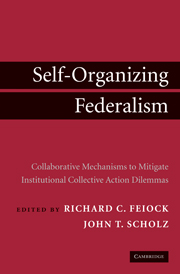 Self-Organizing Federalism
Self-Organizing Federalism Book contents
- Frontmatter
- Contents
- List of Figures
- List of Tables
- Contributors
- Preface
- PART ONE SELF-ORGANIZING VERSUS CENTRALIZED SOLUTIONS TO INSTITUTIONAL COLLECTIVE ACTION PROBLEMS: THEORETICAL CONSIDERATIONS
- 1 Self-Organizing Governance of Institutional Collective Action Dilemmas: An Overview
- 2 Can Consolidation Preserve Local Autonomy? Mitigating Vertical and Horizontal Dilemmas
- 3 The Institutional Collective Action Perspective on Self-Organizing Mechanisms: Market Failures and Transaction Cost Problems
- 4 Conflict, Power, and Irreconcilable Preferences: Some Limits to Self-Organizing Mechanisms
- PART TWO INTEGRATING METROPOLITAN SERVICE PROVISION: NETWORKS, CONTRACTS, AGREEMENTS, AND SPECIAL DISTRICTS
- PART THREE INTEGRATING REGIONAL POLICIES THROUGH NETWORKS, JOINT VENTURES, AND PARTNERSHIPS
- PART FOUR SELF-ORGANIZING GOVERNANCE AND INSTITUTIONAL COLLECTIVE ACTION
- References
- Index
1 - Self-Organizing Governance of Institutional Collective Action Dilemmas: An Overview
from PART ONE - SELF-ORGANIZING VERSUS CENTRALIZED SOLUTIONS TO INSTITUTIONAL COLLECTIVE ACTION PROBLEMS: THEORETICAL CONSIDERATIONS
Published online by Cambridge University Press: 29 January 2010
- Frontmatter
- Contents
- List of Figures
- List of Tables
- Contributors
- Preface
- PART ONE SELF-ORGANIZING VERSUS CENTRALIZED SOLUTIONS TO INSTITUTIONAL COLLECTIVE ACTION PROBLEMS: THEORETICAL CONSIDERATIONS
- 1 Self-Organizing Governance of Institutional Collective Action Dilemmas: An Overview
- 2 Can Consolidation Preserve Local Autonomy? Mitigating Vertical and Horizontal Dilemmas
- 3 The Institutional Collective Action Perspective on Self-Organizing Mechanisms: Market Failures and Transaction Cost Problems
- 4 Conflict, Power, and Irreconcilable Preferences: Some Limits to Self-Organizing Mechanisms
- PART TWO INTEGRATING METROPOLITAN SERVICE PROVISION: NETWORKS, CONTRACTS, AGREEMENTS, AND SPECIAL DISTRICTS
- PART THREE INTEGRATING REGIONAL POLICIES THROUGH NETWORKS, JOINT VENTURES, AND PARTNERSHIPS
- PART FOUR SELF-ORGANIZING GOVERNANCE AND INSTITUTIONAL COLLECTIVE ACTION
- References
- Index
Summary
Dramatic change has occurred in the last two decades in how governments carry out public policies. In our complex, interconnected, and information-dense world, policy problems increasingly transcend the jurisdictional boundaries of governments and their specialized agencies at all levels (Scholz and Stiftel 2005; Donahue 2006). Examples abound of agencies working across jurisdictions, across levels of government, across agencies, and across sectors (Bardach 1998; Milward and Provan 2000; Linden 2002). Rhodes (2007) argues that in Britain privatization and dispersion of authority have transferred policy coordination functions from the central state to decentralized and informal policy networks. Kettl (2002) describes this as a “transformation of governance” characterized in the United States by the emergence of collaborative institutions in which multiple agencies, governments, and other stakeholders work together to solve problems that affect them.
This volume introduces and develops the institutional collective action (ICA) framework to understand the challenges for governance imposed by the forces of globalization that exacerbate the negative consequences of fragmentation of authority, particularly in federalist systems in which fragmentation is an inevitable aspect of the allocation of formal authority. ICA applies the framework of collective action, initially developed to explain individual behavior, to institutionally defined composite actors such as local governments or government agencies and their constituencies. Fragmented authority produces dilemmas for institutional actors whenever decisions by one authority affect outcomes of other authorities, particularly when independent decisions by each authority lead to poor policy outcomes not favored by anyone: uncoordinated investments by local governments create excessive capacity and expensive service provisions; one authority's regulations undermine the effectiveness of another's; one agency's project competes with that of another agency rather than complementing it.
- Type
- Chapter
- Information
- Self-Organizing FederalismCollaborative Mechanisms to Mitigate Institutional Collective Action Dilemmas, pp. 3 - 32Publisher: Cambridge University PressPrint publication year: 2009
- 12
- Cited by


